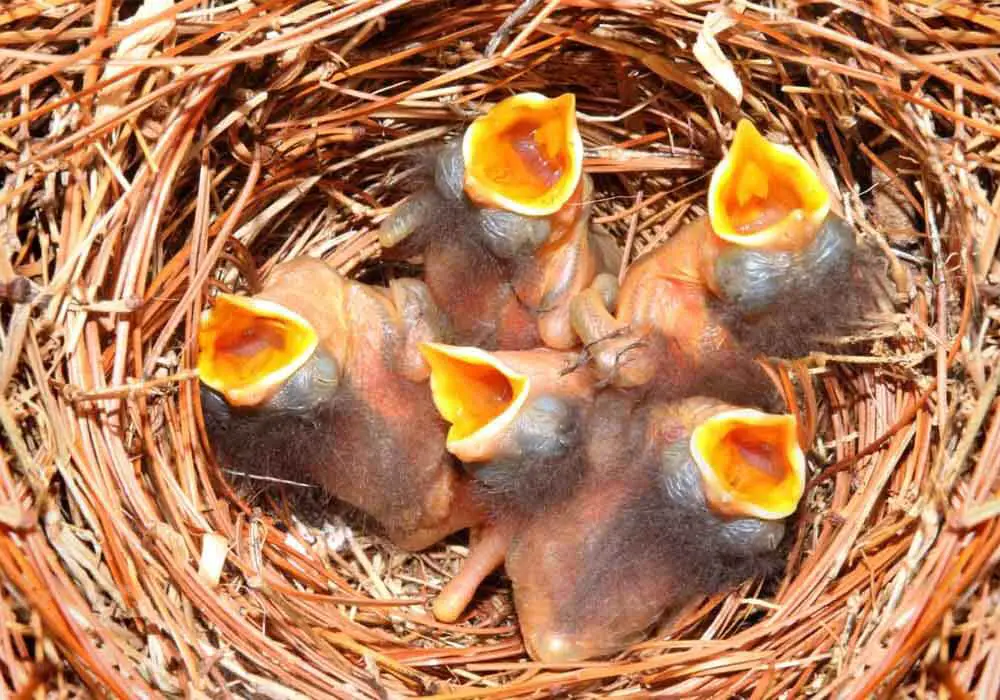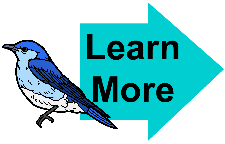Bluebird Babies Facts
There's More To These Chicks Than Just Cute Looks!
Characterized by their bright blue feathers and adorable chirps, bluebirds are undoubtedly one of the cutest birds around. Interestingly, bluebird babies are born both naked and blind but tend to grow fast in just a matter of weeks. So what are some of the interesting bluebird babies facts you should know about?
There are several notable bluebird babies facts. First, these tiny birds develop their famed blue feathers around 2-3 weeks after hatching. The eggs take 12-14 days to hatch and are taken care of by both parents. Bluebird babies turn into fledglings in about 3 weeks and never return to the nest.
Today, we’ll get into all the facts about baby bluebirds. You’ll love learning all about them, so let’s jump in!

When Do Bluebird Babies Hatch?
It takes between twelve and fourteen days for bluebird eggs to hatch. However, the countdown to hatching only begins once the mother bird begins to incubate them.
Bluebird mothers lay their eggs but don't always begin to incubate them immediately. Between the initial laying and the incubation period, which lasts between twelve and fourteen days, the eggs are in a pending state.
During this pending state, the eggs are essentially frozen in time. They aren't developing, but they also aren't dying. If left too long, however, they won't fully develop, and the mother will have lost her baby birds, unfortunately.

Learn about the fascinating process of Bluebird nesting and all the behaviors that come with it from this helpful article we wrote about it. You'll appreciate the end result (cute babies) even more after you read this.
What Are Bluebird Babies Called?
Obviously, they’re called bluebird babies, right? Actually, no!
Bluebird babies have special names depending on what stage of life they are in. When they are fresh from the egg, they are called "hatchlings." About four days after they hatch, they become "nestlings." From about three weeks onward, they are called "fledglings."
When the babies first hatch, they are known as hatchlings. At this stage, the babies are naked, with only a few patches of feathers here and there. Hatchlings are born with their eyes closed and are typically balled in fetal positions. You may also notice dark lines that run throughout the body. Hatchlings depend highly on their mothers to keep them warm since they don't have feathers yet.
Once the hatchlings become nestlings, they begin to grow feathers and more down. They also begin to open their eyes. Around day six, the nestlings begin to develop feathers, which is a huge boost to their chances of survival. By day nine, they are well on their way to succeeding in life.
The birds turn into fledglings at about three weeks, and this is usually when they end up leaving the nest. From this point forward, the birds begin to learn how to live independently, with a little parental assistance, of course!
What Color Are Bluebird Babies?
The color of bluebird babies largely depends on the stage of life they’re in.
Hatchlings are typically pink with gray patches here and there. Nestlings are mostly dark gray, but they begin to develop the blue tip on their wings quite early. Fledgling bluebirds are primarily gray with blue wing tips.
Baby bluebirds start out being almost completely gray. As they mature, the blue tips emerge. Eventually, if the birds are male, they become predominantly blue; if they are female, they remain mostly gray with blue streaks.
What Do Bluebirds Feed Their Babies?
Bluebirds feed their babies insects such as crickets, spiders, grasshoppers, and butterflies. They also provide them with various berries, such as raspberries, mulberry, and cherries.
Usually, the male does most of the feeding and caretaking, at least for the first five days. This is because the female spends her time still helping to keep the babies warm.
Once the babies can regulate their body temperature, the female takes over with some of the feeding.

Before there's a chick there has to be an egg, and boy are eggs a fun topic in itself! Here's a great article of ours where you'll learn all sorts of fun Bluebird egg facts!
How Long Do Bluebirds Feed Babies?
Bluebirds typically feed their babies until they reach the age of fledglings, at about three weeks. At this time, the bird normally leaves the nest. However, the parent still takes care of the baby for about a week after it leaves the nest.
After this first week, the young birds begin to mimic their parents in hunting patterns. They start to demonstrate the sit-wait-drop strategy typically displayed by adult bluebirds. The adult bluebirds still help out with their feeding while the baby learns how to hunt.
Once the baby can do well on its own, usually about five weeks in, it begins providing for itself without any assistance.
At this point, the bluebirds begin to take long trips away from their families. And once they feel comfortable enough, they join together with other juvenile bluebirds in the region.
How Long Do Bluebirds Take Care of Their Babies?
Bluebirds take full-time care of their babies for between four and five weeks. After this, the fledgling begins to go off on its own. Even after the baby bird gains some independence, it still relies heavily on its parents.
The parents teach the baby social behaviors, hunting techniques, and so on for a few months.
Baby bluebirds often remain with their parents longer when they hatch in late summer. They will remain with their parents throughout the winter because they aren't strong enough to go out on their own before the temperatures become too cold.
How Often Do Bluebirds Feed Their Babies?
In the beginning, bluebirds feed their babies up to 12 times per day. By the time they are nestlings, the birds only need to eat between 3 and 7 times per day. Afterward, they are fed about twice or thrice daily when they become fledglings.
Hatchlings are a lot like newborn human babies. Their stomachs are so small that they can't hold very much food. They also process the food fast, which explains why they must eat every couple of hours.
The feeding patterns rapidly change as the birds develop into nestlings. At this point, they only need as little as half of what they were eating just a few days before.
Once the birds become fledglings, they get fed significantly less frequently. This is partly due to them learning how to hunt on their own around this time.
How Fast Do Bluebird Babies Grow?
Bluebird babies are typically considered "full grown" once they turn into fledglings at around three weeks. They still rely on their parents for a couple more months but are fully independent by the time they are five months.
In terms of physical growth, they grow exponentially within just a few short weeks. One moment you have a tiny hatchling, and the next, they're on their way into adulthood.

Bluebird babies go thru some amazing growth stages. We wrote this article which will take you thru all of those growth stages from egg to flight which you can find here.
How Long Before Bluebird Babies Fly?
Most baby bluebirds begin flying between 16 and 22 days after hatching. The average time frame for a baby to take flight is 19 days after hatching. But this varies from bird to bird.
Some baby bluebirds need more time in the same way that some toddlers need more time before they walk well. Usually, the adult bluebirds will start to push the babies towards exiting the nest at about 14 days after hatching.
The baby birds typically still have some hesitancy at this time, but most of the time, they take flight on their own by the twentieth day or so after hatching. At this point, they are usually confident enough from watching their parents take flight so many times.
Bluebird Babies Facts...Final Thoughts
There's a lot to learn about baby birds and their behaviors. When you're up close with them, they are fascinating, but there's a lot of joy in learning about them from a distance.
Who knows, maybe the next time you come across a bluebird nest, you'll be well-placed to share some of these bluebird babies facts with those around you.
Back To The TOP Of This Bluebird Babies Facts Page

About the Author...
Richard Worden, a dedicated bird lover for over 20 years, I love to share my in-depth knowledge and passion for birds. Read more About Me and my expertise in this field.
- We Know Birds HOME ›
- Bluebird Facts and Information ›
- Bluebird Babies Facts
